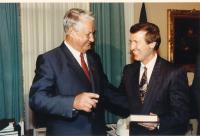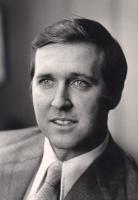
Rep. William Cohen campaign photo, 1974
Raymond H. Fogler Library
Text by Candace Kanes
Images from Raymond H. Fogler Library, Edmund S. Muskie Archives, and Northeast Historic Film
William S. Cohen of Bangor had been a member of the U.S. House of Representatives for less than a year in 1973 when he found himself in a position he likened to that of William Pitt Fessenden (1806-1869), also a Republican from Maine.
Fessenden was a U.S. Senator when he was called on to vote on the impeachment of President Andrew Johnson. Fessenden was one of seven Republican Senators to voted against the impeachment, breaking away from the more radical Republicans in Congress.
Cohen, a member of the House Judiciary Committee that was hearing evidence against fellow Republican Richard Nixon in the Watergate burglary and cover-up case, voted with the Democratic majority on a resolution that rejected the White House offer to provide transcripts of White House tapes rather than the tapes themselves.
Cohen wrote of his vote, "I had acted with the naiveté and arrogance of a new recruit fresh out of basic training, armed with gleaming thoughts of truth, justice, and the American way.

Maine congressional delegation, Augusta, 1975
Edmund S. Muskie Archives and Special Collections Library
"I did not doubt that I had cast the 'right' vote that night. But I knew intuitively that I had crossed a line that would define the rest of my career in Congress – which at the moment I believed would be of limited duration."
He also voted in favor of impeachment of Nixon. He wrote of the Watergate affair, "Each of us, by a force of circumstances beyond our desire or control, was placed on a high wire that was strung between disloyalty to party and disloyalty to principle."
The freshman Representative from Maine was in the spotlight, as Fessenden had been. Cohen speculated that Maine politicians had reputations for independence. He also cited Republican Margaret Chase Smith's 1950 "Declaration of Conscience" speech in which she criticized Sen. Joseph McCarthy's anti-communist crusade.
Even though Nixon resigned, Cohen was permanently on the outside of Republican power in the House. But neither his political career nor his time in the spotlight was over.

Boris Yeltsin visits U.S. Congress, Washington D.C., 1991
Raymond H. Fogler Library
Elected to the Senate in 1976, Cohen again was called on to take a stand unpopular with his party. In 1987, he was named to a Joint Congressional Committee appointed to investigate the Iran-Contra scandal.
Republican President Ronald Reagan said he would not trade arms to seek release of American hostages, but his administration was shown to have sold weapons to Iranians and given funds from the sales to Nicaraguan insurgents.
Cohen believed the activities were unconstitutional and wrote that they "posed a serious threat to our democratic form of government."

William S. Cohen, 1972
Raymond H. Fogler Library
He was one of three Republicans who signed the final report that held Reagan accountable for the Iran-Contra affair.
Also on that committee was fellow Maine Senator, Democrat George Mitchell. Mitchell, also concerned about principle, said to Oliver North during the hearings, "Please remember, that it is possible for an American to disagree with you on aid to the Contras and still love God, and still love this country, just as much as you do. Although He is regularly asked to do so, God does not take sides in American politics."
Mitchell and Cohen wrote a book about the Iran-Contra hearings.
After Cohen left the Senate in 1996, Democratic President William Clinton named him Secretary of Defense, a position Cohen held from January 1997 to January 2001 when George W. Bush was inaugurated.
Again, Cohen's bipartisan approach to policy put him in the spotlight.



